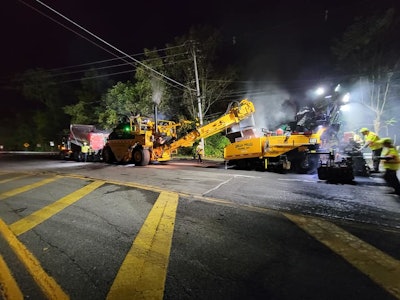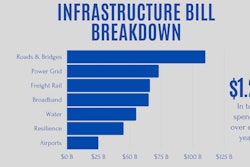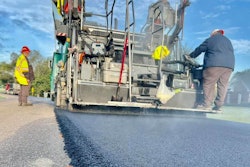
House leaders were unable to come to an agreement that would allow the vote for the $1.2 trillion Infrastructure Investment & Jobs Act to come to the House floor. Despite an appeal from President Joe Biden earlier this week to pass the measure before he departed on an overseas trip, a voting block of dozens of progressive Democrats continue to withhold their support for the infrastructure measure until a separate $1.75 trillion social spending package is also teed up for a House vote.
The progressives have conceded a previous demand that would have required the Senate to pass the $1.75 trillion plan, but are holding firm for House action. The details of the measure were released earlier in the day and the legislation is moving through the chamber’s approval process.
Once it was clear a vote on either measure could not be held, the House passed a second temporary extension of the Highway Trust Fund, ensuring that 3,700 federal employees will not be furloughed. It was set to expire on Oct. 31.
"If the House does not pass (the IIJA) before October 31st, surface transportation programs once again must be extended," Peter DeFazio (D-OR) said earlier in the day. "Short term extensions are highly disruptive of transportation project planning and delivery carried out by States and State Departments of Transportation."
The new extension will extend to Dec. 3, the same day as the government funding extension is set to expire.
Though House Democratic leadership had intended this morning to bring the bipartisan infrastructure plan to the floor for a vote this week, the House will leave that legislation – as well as the broader Build Back Better social spending package – pending until they return next week.
Industry Expresses Disappointment
Once it was clear the House would not pass the IIJA before the October 31st deadline, disappointment for inaction trickled in from all over the country.
U.S. Chamber Executive Vice President and Chief Policy Officer Neil Bradley issued the following statement regarding the delay to vote on the bipartisan infrastructure bill:
"Once again, the House has failed to take up and approve the bipartisan infrastructure bill. Instead, the American people are left with another short-term extension that will slow down much needed investments in transportation infrastructure at a time when China is racing ahead and the World Economic Forum ranks America’s infrastructure 13th in the world.
"Seventy percent of Americans support the bipartisan infrastructure bill, and it deserves a standalone vote on its merits. It is past time for both political parties to put aside their partisan differences and approve a bill that will boost economic growth and improve the quality of life of all Americans.
"Failure to pass the Infrastructure Investment and Jobs Act means:
- NO to broadband access for 14 million Americans;
- NO to clean drinking water for 10 million families;
- NO to a modern electric grid;
- NO to safe highways and bridges;
- and NO to the largest ever investment in addressing climate change.
"The Chamber continues to urge the House to finish the job and approve the bipartisan infrastructure bill now."
The American Association of State Highway & Transportation Officials (AASHTO) echoed their sentiment stating:
“For the second time in a month, Congress has passed a short-term extension of surface transportation programs, leaving state departments of transportation in limbo once again,”Jim Tymon, AASHTO executive director said. “We implore the House to pass—well before December 3—the Infrastructure Investment and Jobs Act, a historic bipartisan bill passed by the Senate almost three months ago. It includes substantial funding increases for all modes of transportation and allows for five years of funding stability for highway, transit, and passenger rail programs—something state DOTs desperately need to deliver a safe, efficient, and multimodal transportation system.
“AASHTO members need certainty to plan transportation projects to meet the needs of their communities and keep our economy moving, and the impact of these short-term extensions is not insignificant. Congress must pass the IIJA immediately to lessen the harmful impacts that come from the lack of a long-term surface transportation bill.”
National Asphalt Pavement Association (NAPA) President and CEO Audrey Copeland, Ph.D., P.E., issued the following statement in response to Congress’ proposed short-term extension of the Fixing America’s Surface Transportation (FAST) Act:
“When this temporary extension ends on Dec. 3, it will mark the six-year anniversary of the FAST Act’s original passage out of Congress in 2015. Legislators cannot continue granting extensions from month to month using funding estimates from the previous decade without causing uncertainty for workers and business owners in the communities they are elected to serve. The bipartisan Infrastructure Investment and Jobs Act of 2021 (IIJA) would inject $550 billion into surface transportation infrastructure, an increase of 55 percent over current levels, providing a predictable funding stream for improving the safety and efficiency of highways, roads, and bridges across the country. NAPA’s government affairs team will continue to make the case in Washington that the time for investment is now and will directly contribute to our nation’s prosperity.”
Still Congressional leaders are certain the funding measure will eventually pass.
Majority Leader Steny Hoyer, after voting for the stopgap transportation funding, told reporters that infrastructure will come to the floor “when we have the votes.”
“We’re gonna deliver,” Hoyer added.
Majority Whip Jim Clyburn echoed this, saying he’s “not worried about” getting infrastructure done by Dec. 3 when the new highway funding extension will expire.
When asked if they would vote on infrastructure, Clyburn said it was “above my pay grade.”
“Steny decides when it comes to the floor, Nancy decides what comes to the floor, so you have to talk to one of them,” he said. “I have no idea, I’ll be ready to do my job when it gets to the floor.”
Future Funding Uncertainty
According to the National Asphalt Pavement Association (NAPA), when it comes to the highway funding levels, the Senate Appropriations Committee assumed the FAST Act would be extended for a full year. The House FY 2022 Transportation Appropriations bill assumed the House INVEST in America Act would be enacted into law.
If the House takes up and passes the Infrastructure Investment and Jobs Act (IIJA), then the FY 2022 Transportation Appropriations bill will have to be rewritten. If IIJA is not enacted into law, then assume the Senate Appropriations Committee funding levels for FY 2022. As the continuing resolution is set to expire on December 3, Congress will need to pass all 12 appropriations bills to fund the federal government including the U.S. DOT and raise the public debt ceiling.




















